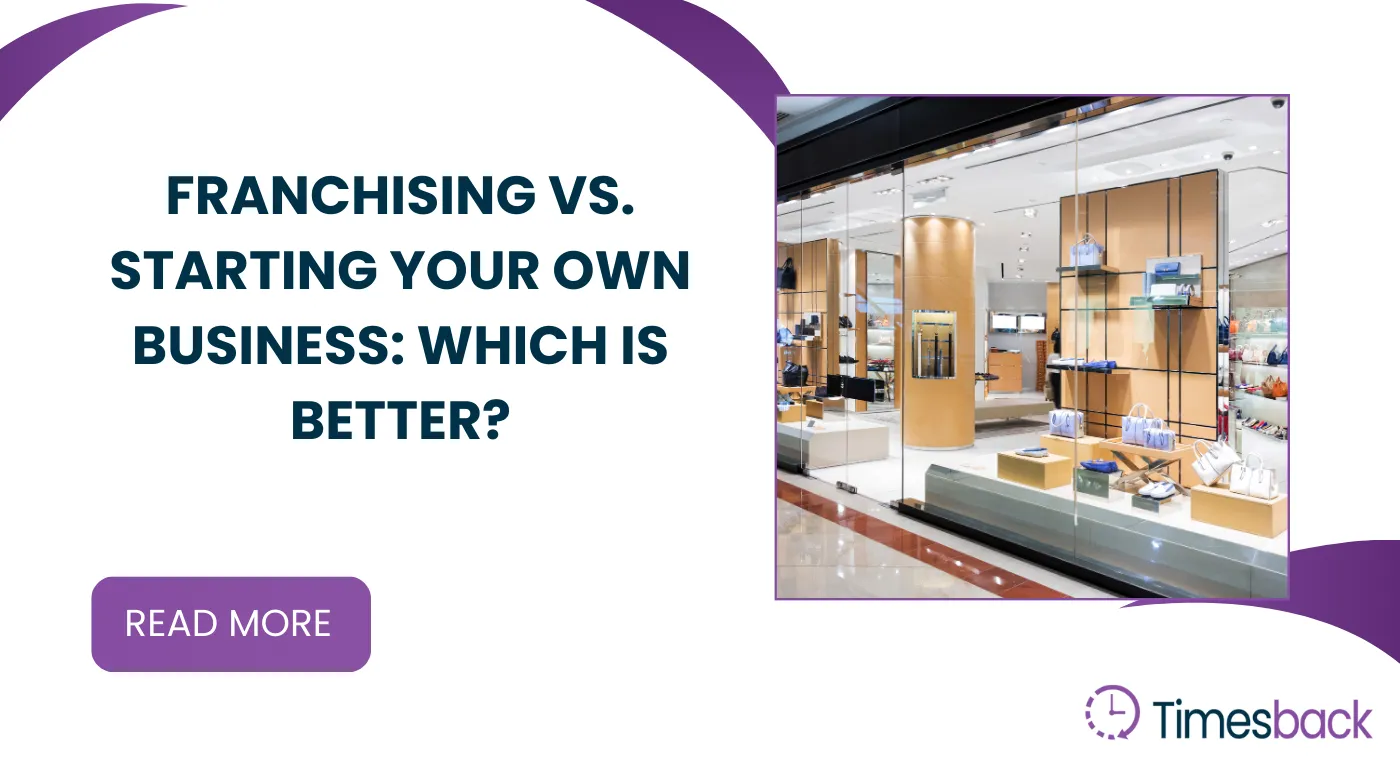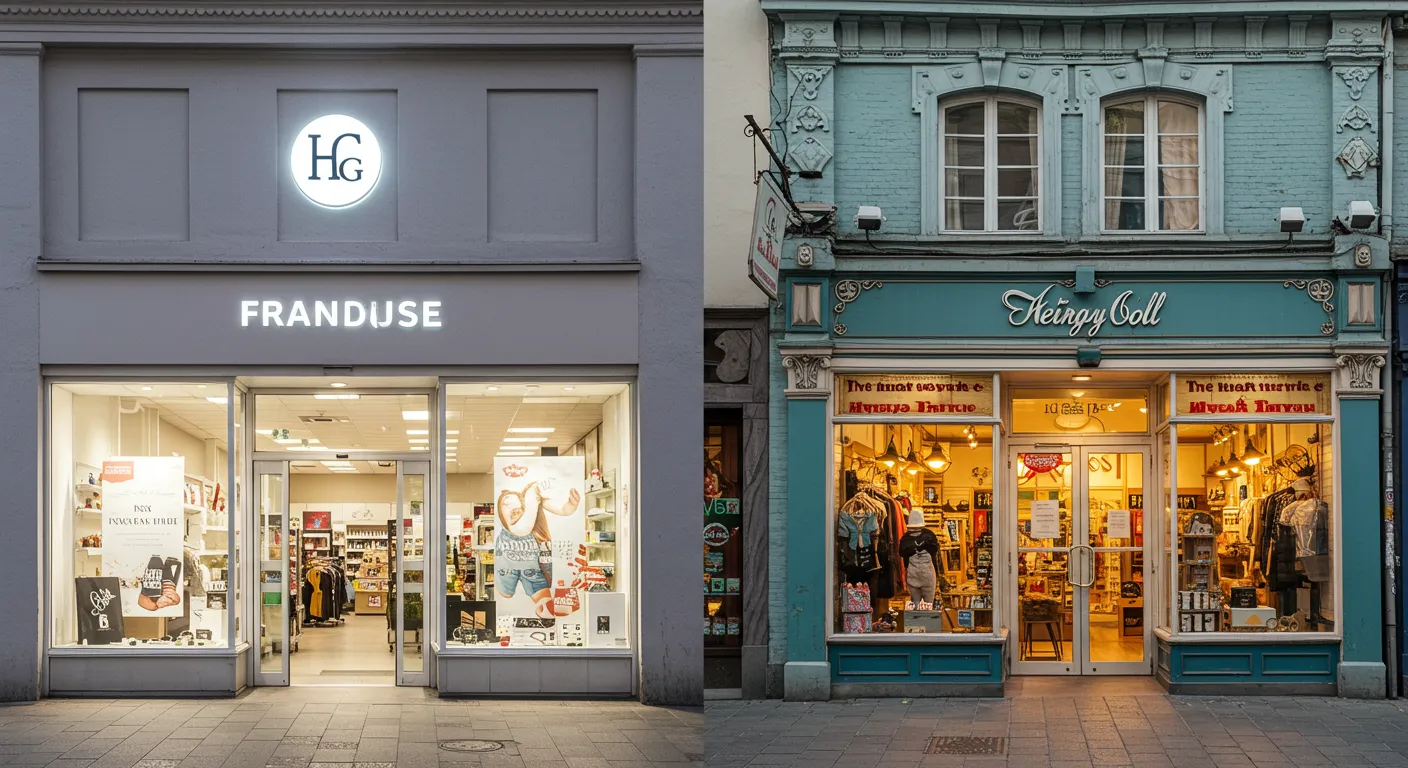Franchising vs. Starting Your Own Business: Which Is Better?

When it comes to entrepreneurship, the debate between franchising vs. starting your own business is a pivotal one.
Anúncios
Both paths offer unique opportunities and challenges, but which one is better for you?
The answer depends on your goals, risk tolerance, and resources.
In this article, we’ll explore the pros and cons of each option, backed by data and real-world insights, to help you make an informed decision.
Anúncios
Understanding the nuances of each approach is crucial.
Franchising can often provide a sense of security due to its established nature, while starting your own business allows for creativity and personal expression.
Understanding the Basics: Franchising and Independent Ventures
Franchising involves operating a business under an established brand, following a proven model, and paying fees or royalties to the franchisor.
On the other hand, starting your own business means building a brand from scratch, creating your own systems, and taking full responsibility for success or failure.
According to the International Franchise Association, the franchise industry contributed over $825 billion to the U.S. economy in 2022, showcasing its significant role in the business landscape.
But does this mean franchising is the superior choice?
Let’s dive deeper.
Understanding the specific requirements and expectations of each option can also aid in decision-making.
For instance, potential franchisees should consider the level of support they desire and the type of industry they are passionate about.
The Case for Franchising: Stability and Support
One of the most compelling arguments for franchising is the built-in support system.
When you invest in a franchise, you’re not just buying a business—you’re gaining access to a proven blueprint for success.
This includes:
- Brand Recognition: Established franchises like McDonald’s or Subway come with instant customer trust and loyalty.
- Training and Resources: Franchisors often provide comprehensive training programs, marketing materials, and operational guidelines.
- Lower Risk: With a tested business model, the likelihood of failure is significantly reduced compared to independent startups.
However, franchising isn’t without its drawbacks.
High initial investment costs, ongoing royalty fees, and limited creative control can be significant deterrents.
Additionally, franchisees may find themselves constrained by the franchisor's rules and regulations, which can stifle innovation.
While the support system is beneficial, it may not align with the entrepreneurial spirit of those seeking to create something entirely new.
+ The Pros and Cons of Franchising: Is It the Right Path for You?
The Appeal of Starting Your Own Business: Freedom and Flexibility
For many entrepreneurs, the allure of starting your own business lies in the freedom to innovate and build something truly unique.
Independent ventures allow you to:
- Pursue Your Vision: You have complete control over your brand, products, and services.
- Adapt Quickly: Without the constraints of a franchisor, you can pivot your strategy based on market trends or customer feedback.
- Retain All Profits: Unlike franchising, there are no royalty fees eating into your revenue.
That said, the risks are higher.
According to the U.S. Bureau of Labor Statistics, approximately 20% of small businesses fail within their first year, and nearly 50% don’t make it past five years.
Moreover, starting your own business requires a significant investment of time and effort, often with no guaranteed returns.
Entrepreneurs must be willing to embrace uncertainty and navigate challenges independently, which can be both exhilarating and daunting.

Financial Considerations: Upfront Costs and Long-Term ROI
Let’s break down the financial aspects of franchising vs. starting your own business with two comparative tables:
Table 1: Upfront Costs
| Expense | Franchising | Independent Business |
|---|---|---|
| Initial Investment | $50,000 - $1M+ | $5,000 - $100,000 |
| Franchise Fees | $10,000 - $50,000 | $0 |
| Marketing Costs | Included in Franchise | $5,000 - $20,000 |
| Equipment and Supplies | $50,000 - $200,000 | $10,000 - $50,000 |
Table 2: Long-Term Financial Outlook
| Factor | Franchising | Independent Business |
|---|---|---|
| Royalty Fees | 4% - 12% of Revenue | $0 |
| Profit Margins | 10% - 20% | 20% - 40% |
| Growth Potential | Limited by Franchisor | Unlimited |
| Risk of Failure | 10% - 15% | 20% - 50% |
As you can see, franchising often requires a higher upfront investment but offers more predictable returns.
Independent businesses, while riskier, have the potential for higher profitability and scalability.
Additionally, understanding the long-term financial implications can help you make a more informed choice.
For example, while franchising may offer stability, the ongoing fees can accumulate significantly over time, impacting overall profitability.
++ How to Evaluate a Franchise Agreement: Key Considerations
Risk and Reward: Which Path Aligns with Your Goals?
When evaluating franchising vs. starting your own business, it’s essential to consider your risk tolerance.
Franchising provides a safety net, but it also limits your ability to innovate.
Independent ventures, while riskier, offer the chance to disrupt industries and create something groundbreaking.
For example, consider the story of Shake Shack.
What started as a single hot dog cart in New York City grew into a global phenomenon because the founders had the freedom to experiment and refine their concept.
On the flip side, franchises like Dunkin’ Donuts thrive by offering consistency and reliability, which appeals to a different type of entrepreneur.
Ultimately, the decision should align with your personal goals and comfort level with risk.
Evaluating past experiences and future aspirations can provide clarity in choosing the right path for you.
The Role of Passion and Expertise
Your personal strengths and interests should also play a significant role in your decision.
If you’re passionate about a specific industry but lack experience, franchising can provide the training and support you need.
Conversely, if you have a unique idea and the expertise to execute it, starting your own business might be the better choice.
Moreover, aligning your business choice with your passions can lead to greater satisfaction and motivation.
Entrepreneurs who are deeply invested in their work are more likely to persevere through challenges and setbacks.
Finding the right match between your skills and business model can be a key factor in long-term success.
For more insights and resources on entrepreneurship, check out Entrepreneur.com.

Market Trends and Future Outlook
The business landscape is constantly evolving, and both franchising and independent ventures must adapt to stay relevant.
For instance, the rise of e-commerce and digital marketing has leveled the playing field for small businesses, making it easier to compete with established brands.
However, franchises are also innovating.
Many are embracing technology to streamline operations and enhance customer experiences, proving that even traditional models can evolve.
As consumer preferences shift, businesses must remain agile and responsive to maintain their competitive edge.
Staying informed about market trends can help entrepreneurs identify opportunities for growth and adaptation.
Conclusion: Which Is Better—Franchising or Starting Your Own Business?
The decision between franchising vs. starting your own business ultimately comes down to your individual goals, resources, and risk tolerance.
Franchising offers stability, support, and a proven model, but at the cost of higher fees and limited creativity.
Starting your own business provides freedom, flexibility, and unlimited potential, but with greater risk and responsibility.
Before making a choice, conduct thorough research, consult with industry experts, and evaluate your long-term objectives.
Whether you choose to invest in a franchise or build your own empire, success will depend on your dedication, adaptability, and willingness to learn.
